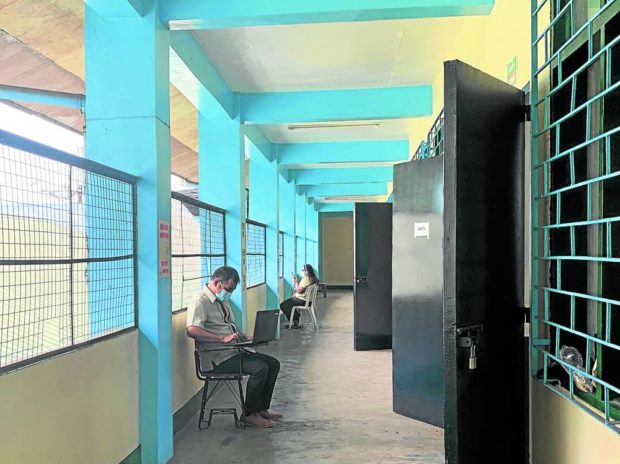Teachers hit DepEd rule on on-site reporting

BACK TO SCHOOL Teachers report on-site in this school in Quezon City on Monday but some are forced to conduct online classes along corridors to ensure stable internet connection.—JANE BAUTISTA
MANILA, Philippines — On the first day of her on-site reporting after more than two years of doing remote work, social studies teacher Mary Joy Valenzuela faced a laptop inside an empty classroom that had chairs and desks covered in a thick layer of dust.
Although their school in Quezon City has yet to hold physical classes, the 37-year-old Valenzuela had to report on Monday in line with the mandatory physical reporting policy of the Department of Education (DepEd).
Fortunately for her, her internet signal remained steady and her online classes went smoothly although other teachers were not as lucky.
Some had to stay in the corridors to ensure a stable connection while others conducted their online classes simultaneously inside a cramped faculty room, prompting their students to complain about the background noise.
Under DepEd Memo No. 29, series of 2022, teaching and nonteaching personnel in schools and offices were required to adhere to 100-percent on-site reporting.
But not all schools were equipped and prepared to support their internet needs.
“If we are here but there are no students, what is the sense of this kind of system?” Valenzuela said.
Ruby Ana Bernardo, a Grade 10 Filipino teacher, said the school adopted a blended learning modality of online and digital with educational materials being uploaded through Google Classroom or via Facebook Messenger.
“Amid the pandemic, we only had to report physically … if there [were] concerns with the students or we [needed] to talk to the parents,” Bernardo told the Inquirer.
Learning crisis real
But she said that teachers were also eager to gradually implement face-to-face classes “because the learning crisis amid the pandemic is real.”
On average, each class in their school has 45 students, some of whom are working students while others find it hard to keep up with school requirements.
“In terms of intervention, we did everything to adjust the lessons and requirements. For example, there are eight most essential learning competencies. I only teach four which I think are enough to cover what they need to learn,” Bernardo said.
Still, poor learning conditions amid the COVID-19 pandemic were being exacerbated by the DepEd policy that, according to her, was “implemented hastily without consultation.”
She added that it was also “irrational” that teachers needed to go to school to conduct online classes when many of them had invested in a work-from-home setup.
Some even took out loans for computer desktops and Wi-Fi service but since they could not bring their equipment to school, they were left with no choice but to borrow laptops from the school or their coteachers, according to Bernardo.
Commuting woes
Others also complained about how they had to pay yet again for another hot spot connection because the school could not provide internet service for all of them for now.
“It’s also unproductive because other teachers live far away from here and they need to travel for a 7 a.m. class when they [could easily conduct classes] in their homes,” Bernardo said.
Julius de la Cruz, a Filipino teacher for Grade 10 students, said he left his house in Bagong Silang, Caloocan City, at 6:30 a.m. and arrived at the school around 8 a.m.
“We have suffered amid the pandemic and now we’re suffering even more [because of the work arrangement policy],” Bernardo said.
“We really need technical support. If we really need to do on-site reporting, DepEd should help us have a Wi-Fi or internet allowance,” she added.
Another concern, according to her, was the possibility of COVID-19 infections under the new setup.
She expressed hope that DepEd officials would “listen to us and consider our situation.”
Alliance of Concerned Teachers-National Capital Region (ACT-NCR) union members, meanwhile, went to the DepEd NCR office in Quezon City to call for a dialogue on the suspension of the policy’s implementation.
Based on a survey conducted by ACT-NCR, 8,106 of the 9,254 teacher-respondents, or 87.6 percent, said the internet in their schools could not serve all of those conducting online classes simultaneously.
“This was the top issue raised by survey participants, followed by health risks in light of the still ongoing pandemic, then transportation concerns,” it said.
“Forcing a blanket policy among teachers—and without any prior consultation—unnecessarily puts teachers in more challenging conditions, without any guarantee of support from DepEd, and while further impeding education delivery,” said Vladimer Quetua, ACT-NCR union president.
RELATED STORIES
Teachers taking out loans to prepare classrooms
Teachers question DepEd on budget for school reopening














